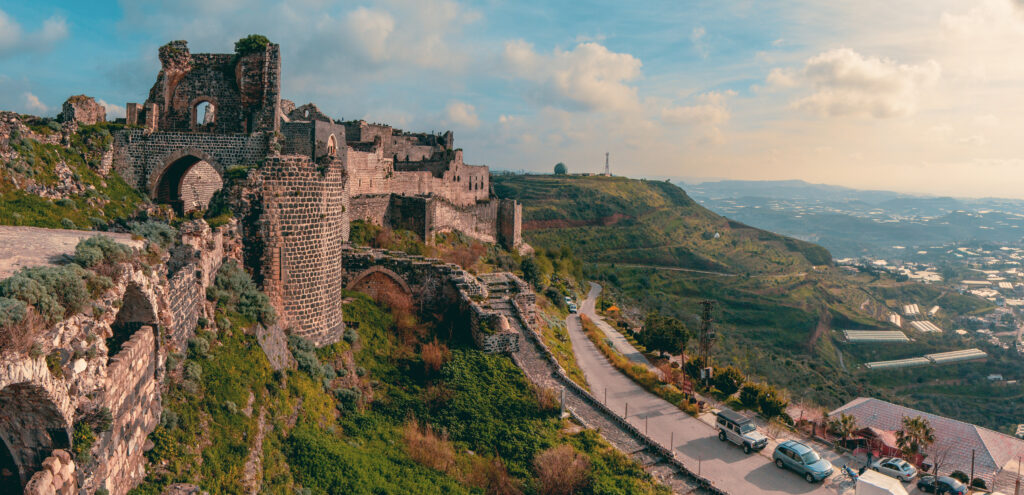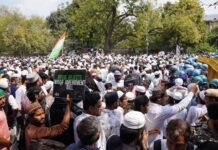
As accusations of the widespread killing of Alawite civilians have emerged, Syrian President Ahmed al-Sharaa said today that recent security incidents in the country’s coastal region are “under control,” terming them as “expected challenges.”
“The crisis has passed safely,” Sharaa said after attending fajr prayer at a mosque in the Al Mezzeh district of Damascus.
“What is happening in the country are expected challenges. We must preserve national unity and civil peace among Syrians,” he stressed.
“We are capable of living together in this country as much as possible,” he added.
In recent days, the coastal provinces of Latakia and Tartus have seen heightened security tensions amid coordinated attacks by loyalists of the former Assad regime. These attacks – described as the most severe since the regime’s fall in December – targeted security patrols, checkpoints, and hospitals, resulting in deaths and injuries.

In response, security and military forces launched sweeping operations to track down the attackers.
According to a war monitoring group, Syrian security forces are alleged to have killed hundreds of civilians belonging to the Alawite religious minority.
Subscribe to our newsletter and stay updated on the latest news and updates from around the Muslim world!
The British-based Syrian Observatory for Human Rights (SOHR) said some 745 civilians had been killed in around 30 “massacres” targeting Alawites on Friday and Saturday.
Hundreds of people have also reportedly fled their homes in the region – a heartland of deposed president Bashar al-Assad, who also belongs to the Alawite sect.
A total of more than 1,000 people have been killed in the past two days, the SOHR said, in what is the worst violence in Syria since rebels toppled the Assad regime in December.
This figure includes dozens of government troops and gunmen loyal to Assad, who have been locked in clashes in the coastal Latakia and Tartous provinces since Thursday.
Some 125 members of the government security forces and 148 pro-Assad fighters have been killed in the violence, according to the SOHR’s report.
Investigative committee
Meanwhile, the Syrian Defence Ministry has established an emergency committee to investigate potential violations that occurred during military operations March 6 – 7 and to prosecute those responsible.
The committee has been tasked with carefully examining if command instructions were followed during the operations, and those found to have violated the rules will be referred to a military court, the official Syrian news agency, SANA, reported.
“As a ministry, we place great importance on ensuring that all our military operations are conducted in accordance with international law and human rights. This committee will play a crucial role in detecting and investigating potential violations,” said a source from the ministry.
The committee will also examine issues such as the protection of civilians during operations, the prevention of unnecessary use of force and adherence to military ethical standards.
The results of the committee’s work will be shared with the public, the report said.
Who are the Alawites?
The Alawites are a non-Muslim sect that ruled Syria for 54 years (1970-2024).
Historically known as Nusayris, they date back to the 9th century in Iraq. Named after Muhammad ibn Nusayr, who declared himself the messenger of the “11th Shia Imam” Hasan al-Askari, the sect migrated to Syria under the Hamdanid dynasty.
Over centuries, they faced suspicion and crackdowns over their heretical beliefs, which led to their concentration in the mountainous areas of Latakia for safety.
Alawite beliefs are quite distinct from mainstream Sunni and Shia Islam. Alawites believe in a trinity of sorts with Prophet Muhammad (pbuh), Ali (ra) and Salman al-Farisi (ra) representing manifestations of the divine (astaghfirullah).
Their secretive belief system also includes the concept of reincarnation, which is antithetical to orthodox Islamic theology.
Sunni scholars, historically and into contemporary times, do not consider Alawites to be Muslims due to their beliefs which significantly diverge from orthodox Sunni Islam.

The political dominance of Alawites in Syria under the Assad regime has further complicated Sunni-Alawite relations. The Assad family’s rule over a predominantly Sunni population has led to accusations of Alawite favoritism, which has fueled sectarian conflict, especially during the Syrian Civil War.
After Syria gained independence in 1946, the Alawites’ influence grew significantly. In 1963 Alawite officers were instrumental in the coup that brought the Ba’ath Party to power, marking the beginning of Alawite political ascendancy.
And in 1970, Hafez al-Assad, an Alawite, seized power, further entrenching Alawite influence. His rule until his death in 2000, followed by his son Bashar al-Assad’s presidency, solidified Alawite dominance in key governmental and military roles.
Over the past 54 years, Alawites have held a disproportionate number of high-ranking positions in the Syrian military, intelligence, and security services. This control over the security apparatus has been crucial for maintaining the Assad family’s power.
Through alliances with Sunni merchant classes, Alawite elites extended their influence into economic sectors, gaining control over significant portions of the economy.
But the Assad family’s Alawite background has meant that the presidency and many strategic political roles have been occupied by Alawites, leading to a de facto Alawite-led state, despite the Sunni majority.
The fall of the Assad regime has left Alawites in a precarious position, fearing retribution from other groups. The community now faces an uncertain future, having lost their once-dominant role in Syrian politics, society and military.






















